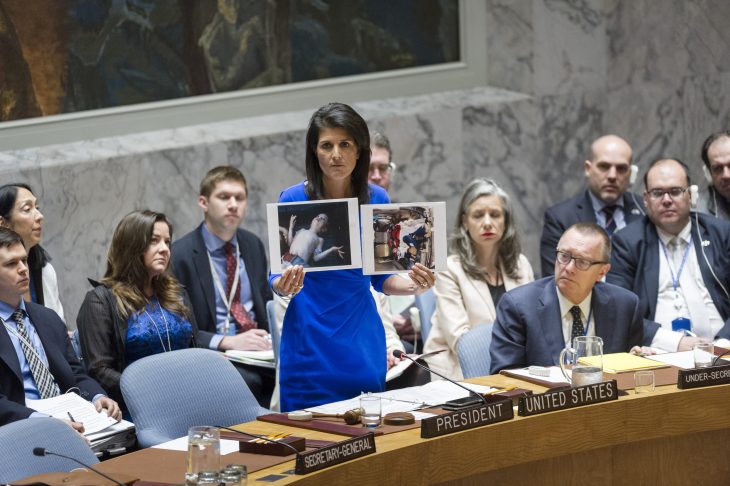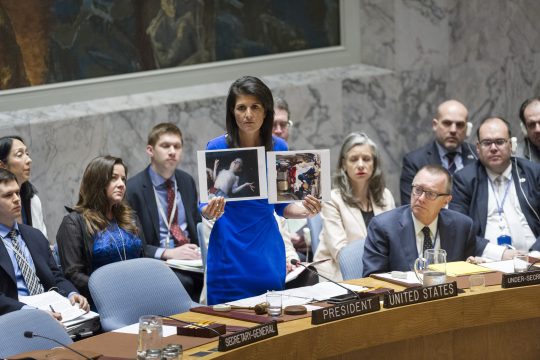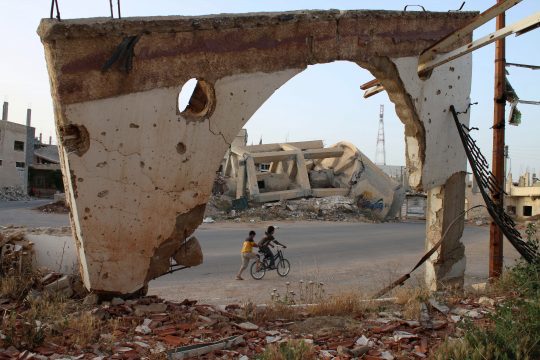Syrian air force use of chemical weapons against civilians is a war crime, or even a crime against humanity. The retaliatory US missile strikes are perhaps legitimate, but certainly illegal under international law.
On Friday August 30, 2013, US President Barack Obama took one of the heaviest decisions of his mandate. He decided to abandon the “red line” that he had himself set. He would not take military action against the Syrian regime, even though it had just used chemical weapons. But new US President Donald Trump took action this Thursday, after seeing the images of dozens of dead and injured in the chemical weapons attack in Khan Cheikhoun. It is too early to tell the impact of the 59 Tomahawk missiles which hit a Syrian military base from which the planes that dropped chemical weapons took off, according to the White House. This is the first time the US government has taken military action against forces of the Damascus regime. Does this signal a policy U-turn by President Trump, who up to now did not want to engage in the Syrian conflict? Or is it just a show of force which will not be followed up? What will be the consequences in the Syrian conflict and elsewhere? The reactions have been immediate. Russian President Vladimir Putin has slammed it as an “aggression” against a “sovereign nation” whilst Western capitals, as well as Saudi Arabia and Israel have welcomed it. Turkish President Recip Erdogan, in a telephone conversation with Russian President Putin denounced what he called an “inhuman chemical attack which threatens the peace talks”, but did not point to who was responsible.
From the point of view of international humanitarian law (IHL), it is clear that the use of chemical weapons, especially against civilians, is totally prohibited and constitutes an international crime. But this clear violation does not make the US strikes legal, even if they can perhaps be considered legitimate. The use of military force, according to IHL, requires a green light from the UN Security Council – impossible to obtain because of the Russian veto – or must constitute an act of self-defence, which is not the case either. Hence the prior declaration of US Ambassador to the United Nations Nikki Haley, arguing the need to act in the face of UN failures: “When the United Nations consistently fails in its duty to act collectively,” she said, “there are times in the life of states that we are compelled to take our own action.”
The Kosovo precedent
In 1999, under the Clinton administration, the US also circumvented the UN Security Council – again because of the Russian veto – arguing that the NATO bombing campaign against Serbia was justified because all non-military options had been exhausted. To date, the Trump administration has not clearly defined its approach with regard to use of force and respect of the law according to IHL. It has stated only that “it is in this vital national security interest of the United States to prevent and deter the spread and use of deadly chemical weapons”.
Let us remember that in 2014 France, supported by a certain number of countries including Switzerland, proposed that UN Security Council members renounce their veto right when mass atrocities have been committed. But the proposal was blocked by the US, Russia and China.
Despite several attempts, notably by France, to get Syria referred to the International Criminal Court (ICC), the Security Council has always refused to do so. The ICC can only intervene if the situation is referred by the Security Council – still impossible because of Russian opposition – or if Syrian ratifies the Court Statutes, which is obviously impossible to imagine in the current circumstances.
One of the few concrete steps taken by the UN Human Rights Council was the decision in 2011 to set up an International Commission of Inquiry on crimes committed in Syria. This was complemented by another resolution, this time by the UN General Assembly last December, deciding the creation of a team to “collect, consolidate, preserve and analyze evidence” pertaining to violations and abuses of human rights and humanitarian law committed in Syria, so that this evidence may be transferred to a tribunal when the time is right.








